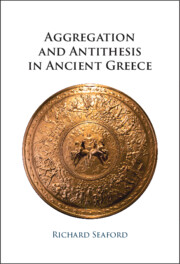Book contents
- Aggregation and Antithesis in Ancient Greece
- Aggregation and Antithesis in Ancient Greece
- Copyright page
- Contents
- Figures
- Preface
- Note on the Text
- Chapter 1 Defining Terms
- Chapter 2 Homer
- Chapter 3 Opposites in Ionian Cosmology
- Chapter 4 Opposites in the Cosmology of Magna Graecia
- Chapter 5 Visual Art from the Near East to Greece
- Chapter 6 The Unity of Opposites in the Fifth Century: Tragedy and Vase-Painting
- Chapter 7 Plato
- References
- Index of Principal Passages
- General Index
Chapter 2 - Homer
Published online by Cambridge University Press: 21 October 2025
- Aggregation and Antithesis in Ancient Greece
- Aggregation and Antithesis in Ancient Greece
- Copyright page
- Contents
- Figures
- Preface
- Note on the Text
- Chapter 1 Defining Terms
- Chapter 2 Homer
- Chapter 3 Opposites in Ionian Cosmology
- Chapter 4 Opposites in the Cosmology of Magna Graecia
- Chapter 5 Visual Art from the Near East to Greece
- Chapter 6 The Unity of Opposites in the Fifth Century: Tragedy and Vase-Painting
- Chapter 7 Plato
- References
- Index of Principal Passages
- General Index
Summary
Homer’s epics constitute a combination of aggregation and antithesis. The most obvious expression of aggregation is the Catalogue of Greeks and Trojans in Iliad 2, which has Near Eastern parallels. This is combined with antithetical (balanced) duels between pairs of warriors. The shield of Achilles (Iliad 18) presents a series of human activities, sometimes in paired form, that suggest symmetrical oppositions (e.g. between war and peace, town and country), though these are introduced in aggregative, list-like language. The shield as a whole edges towards comprehensiveness of a kind we can associate with the emerging polis. The shield of Achilles can be compared with contemporary Phoenician bowls which also convey, in visual form, the combination of aggregation and antithesis. However, the different form of the epic, including extended and structured narrative, gives scope for less bounded forms of antithesis. One such example is the meeting of Achilles with Priam in Iliad 25, replacing extreme violence with peaceful reconciliation. Another, very striking, example is the meeting in battle of former guest-friends Diomedes and Glaukos in Iliad 6 and exchange of armour, gold for bronze. The second incident combines verbal antithesis with a transaction that prefigures commercial exchange.
Information
- Type
- Chapter
- Information
- Aggregation and Antithesis in Ancient Greece , pp. 6 - 32Publisher: Cambridge University PressPrint publication year: 2025
Accessibility standard: Inaccessible, or known limited accessibility
Why this information is here
This section outlines the accessibility features of this content - including support for screen readers, full keyboard navigation and high-contrast display options. This may not be relevant for you.Accessibility Information
Content Navigation
Allows you to navigate directly to chapters, sections, or non‐text items through a linked table of contents, reducing the need for extensive scrolling.
Provides an interactive index, letting you go straight to where a term or subject appears in the text without manual searching.
Reading Order & Textual Equivalents
You will encounter all content (including footnotes, captions, etc.) in a clear, sequential flow, making it easier to follow with assistive tools like screen readers.
You get concise descriptions (for images, charts, or media clips), ensuring you do not miss crucial information when visual or audio elements are not accessible.
Visual Accessibility
You will still understand key ideas or prompts without relying solely on colour, which is especially helpful if you have colour vision deficiencies.
Structural and Technical Features
You gain clarity from ARIA (Accessible Rich Internet Applications) roles and attributes, as they help assistive technologies interpret how each part of the content functions.
